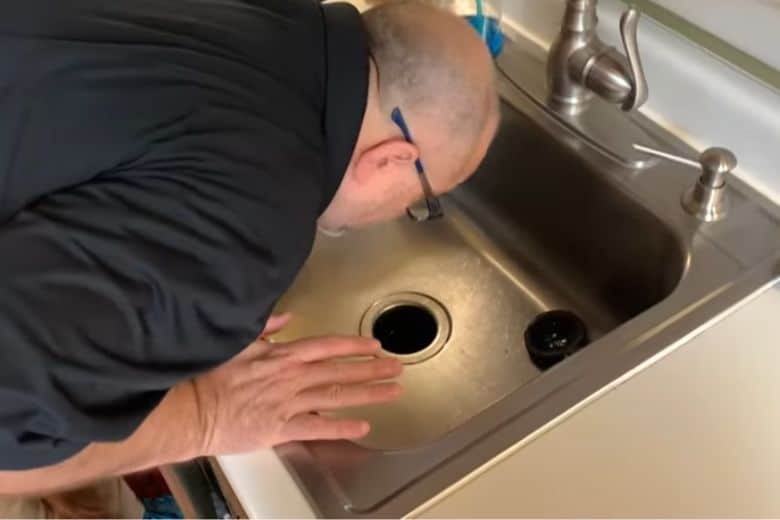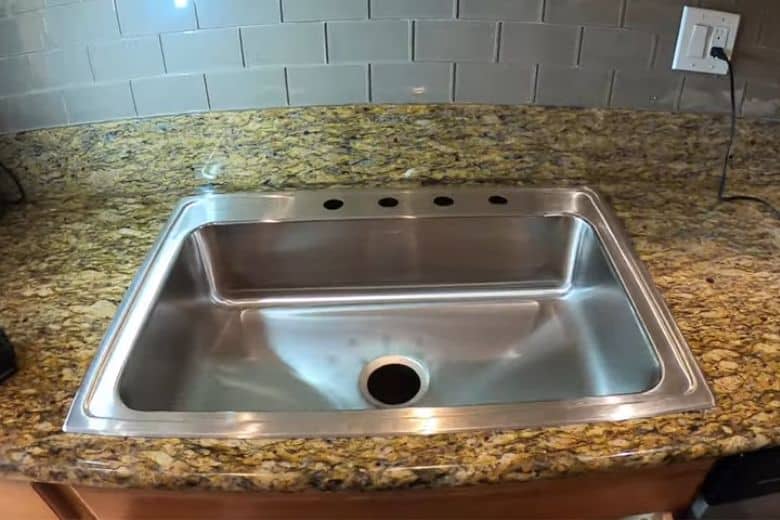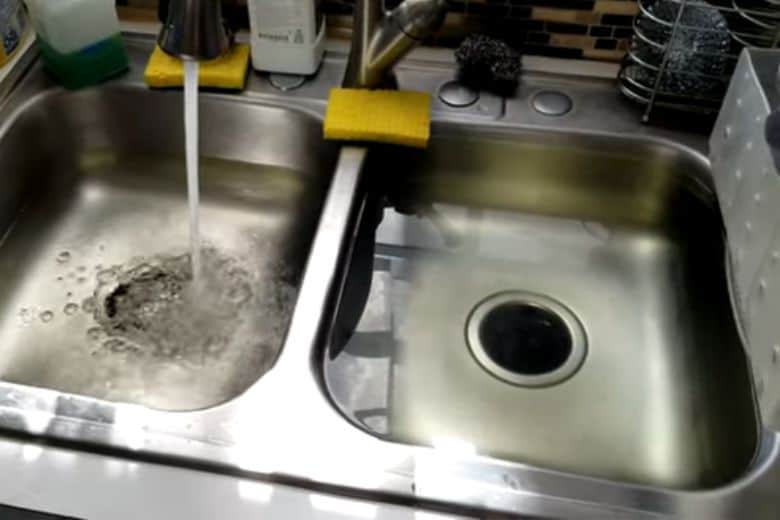Are you struggling with a foul smell coming from your kitchen sink? Is it reminiscent of a dead animal, leaving you worried about its consequence? Since not only is this odor unbearable, but it can also pose health risks to you and your family.
Meanwhile, you began to worry about why your kitchen sink smells like dead animal.
However, kitchen sink odors resembling a dead animal can occur for various reasons. For example, clog or blockage in the drain, grease and food particles buildup, broken garbage disposal and even dead animal can stick in the plumbing.
No matter the reason, the foul odor can make it difficult for you to use the sink for cooking or cleaning.
See the importance of solving the issue of a kitchen sink smelling like dead animals:
- An unpleasant smell in your kitchen can make it difficult to enjoy cooking and eating meals at home.
- The odor can be unsanitary, indicating the presence of harmful bacteria or other contaminants in your plumbing system.
- Ignoring the issue could lead to more severe problems, such as clogs, backups, or even pipes or garbage disposal damage.
- You must identify the root cause of the smell rather than masking it with air fresheners or other temporary solutions.
Eventually, today we will explore the reason for bad smell under your kitchen sink and provide practical solutions to eliminate this odor.
Why Does Your Kitchen Sink Smell Like Dead Animal?
Understanding the root cause of the odor is the first step in eliminating it and preventing it from recurring in the future. Nevertheless, there are several possible reasons why your kitchen sink might smell like a dead animal. The most eight common reasons are:
1. Food Particles and Grease Buildup:
Food particles and grease can get trapped in your kitchen sink, contributing to rotten odors. Over time bits of food get trapped in the drain. As these food particles decompose, they can release gases, creating a smell resembling a dead animal.
In addition, bacteria and other microorganisms can grow in the decomposing material, contributing to the foul odor.
Generally, it occurs when you regularly wash dishes or dispose of food scraps in your sink without properly disposing of them in the garbage or compost.
How to Inspect Food Debris:
- Use a flashlight to look down the drain and check for any visible food debris and grease that may be causing the smell.
- Checking the drain or the P-trap underneath the sink would also be helpful.
2. Broken or Malfunctioning Garbage Disposal:
A broken or malfunctioning garbage disposal can be another because that creates such roguish odors.
It sometimes happens that your garbage disposal is not working properly. Consequently, it may not be able to effectively grind up food scraps, which can lead to a buildup of organic material in your drain and pipes. With time, this buildup can dissolve, deliver gases, and create odors.
Moreover, when your garbage disposal is not properly maintained or cleaned, it can also become a breeding ground for bacteria contributing to the bad smell.
How to Inspect Malfunctioning Garbage Disposal:
- Examine if the disposal is making unusual noises or if it’s not grinding up food properly.
- Use a tool like a wooden spoon to gently rotate the garbage disposals blades to ensure they are moving freely and not jammed.
- Check the garbage disposal for any visible signs of damage, such as cracks, leaks, or broken blades.
- Lastly, inspect the wiring connections to ensure they are secure and not damaged.
3. Clogged Drain Pipe
Another possible cause of a smelly sink is a clogged drain. When water can’t flow freely through the pipes, it can become stagnant and create an unpleasant odor. It can happen if there is a blockage in the pipes, such as grease or hair.
Besides, a clog in a pipe can capture various substances such as food debris, grease, and other organic matter. Over time, these trapped substances can decompose and generate unpleasant odors like hydrogen sulfide and methane.
The smell will be stronger if the clog is located further down the pipe and become concentrated.
How to Inspect Clogged Drain Pipe:
- Analysis is your sink takes a long time to drain or starts to back up when you turn on the faucet.
- Do you hear gurgling or bubbling when water drains from your sink? It could indicate a clog is present.
- Apart from a dead animal smell, do you smell a rotten egg?
- Water is backing up into your sink or overflowing onto the countertop
4. Dead Animal in the Plumbing
Occasionally a tiny animal like a mouse or rat gets trapped in the plumbing and cannot escape. As a result, it can die and create a solid dead smell. Although it is a less common cause but still a possibility. Especially if you have noticed other signs of pests in your home.
Along with the dead animal smell, the dead animal makes an odor like methane and hydrogen sulfide, which can escape through the pipes.
How to Inspect Dead Animals in the Plumbing:
- Conduct a visual inspection of your plumbing system to look for any visible signs of a dead animal.
- Use a specialized camera to look inside the pipes and identify any blockages or obstructions a dead animal may cause.
5. Sewer Gas
If you’ve tried everything and still find no clue about this disgusting, it might be due to an issue with the sewer line.
Sometimes, the smell from your sink may not be related to the sink itself. Instead, it is a problem with your plumbing. Sewer gas can enter your home through the drain pipes, creating an odor that can be mistaken for a dead animal.
It can happen if the plumbing system is not adequately ventilated or if the sewer line has a crack or break that allows gas to escape. Sewer gas comprises several different gases, including methane, ammonia, and hydrogen sulfide, which can combine to produce an overpowering odor.
How to Inspect Sewer Gas Issue:
- Test the sewer line with smoke or colored dye to identify cracks or breaks where gas could escape.
- Check the plumbing system’s ventilation to find it functions appropriately and allows gas to run outside the home.
- Use specialized equipment like a gas detector to identify areas where gas may escape.
6. Old Plumbing Fixtures
Another cause of dead animal stink is old or damaged pipes that might develop cracks or leaks, allowing odor-causing gases to escape. It happens if your kitchen sink is old and the plumbing fixtures have been replaced for a long time.
Over time, old or damaged plumbing fixtures can become corroded and accumulate buildup. Additionally, it can become clogged more quickly, leading to stagnant water and further contributing to the odor problem.
How to Inspect Old Plumbing Problems:
- Check the age of the pipes to determine if they are nearing the end of their lifespan.
- Conduct a visual inspection of the pipes to look for signs of deterioration, such as rust, corrosion, damage, leaks or cracks.
7. Improper Installation of the Sink
The seven number reason may be why your kitchen sink might smell like a dead animal is due to improper installation. When your sink is not installed correctly, it can create gaps between the sink and the countertop. Therefore, can trap food particles, grease, and other debris, leading to a foul odor.
Therefore, it can cause leaks, gaps, or improper drain or garbage disposal alignment. These issues can lead to food particles, debris, and bacteria trapped in hard-to-reach places, creating unexpected odors.
How to Inspect Improper Installation of the Sink:
- Inspect the sealant around the sink to ensure no gaps that could allow odors to escape.
- Take a visual inspection of the pipes to look no obstructions or buildup of debris could be contributing to the odor problem
- Check the alignment of the sink with the drain and garbage disposal to ensure proper drainage.
8. Old and Worn-Out Sink Strainer
An old and worn-out sink strainer can be responsible for causing a foul odor in the kitchen sink. Over time, food particles, grease, and other debris can accumulate in the strainer, creating bacteria buildup, which can lead to an unpleasant smell.
How to Inspect Worn-Out Sink Strainer:
- Review the filter for signs of wear and tear, such as cracks, rust, or corrosion.
- Smell the strainer to determine if it is causing an unpleasant odor in the kitchen sink.
How to Fix the Problem of Bad Smell Kitchen Sink
After understanding the cause of why the sink smells like a dead animal, there are several steps you can take to eliminate the odor, depending on the problem. Have a look one by one.
1. Solution for Food Particles and Grease Buildup
- Very first, remove the sink stopper and clean it thoroughly.
- Next, run hot water into the drain for several minutes.
- Now, pour a hot water and dish soap mixture down the drain.
- Use a sink plunger to loosen and remove any debris.
- Try a natural remedy, pour a mixture of baking soda and vinegar down the drain, let it sit for 15-20 minutes, and flush it with hot water.
- Pour squeeze fresh lemon juice down your sink also help neutralize grease buildup.
2. Solution for Broken or Malfunctioning Garbage Disposal
- Turn off the power supply to the garbage disposal unit.
- Use a garbage disposal cleaner or natural remedy such as ice cubes and citrus peels to clean the disposal and eliminate any buildup.
- You can also use a mixture of baking soda and vinegar, like a food debris solution.
- Check the disposal unit for any blockages or damage and repair or replace it if necessary.
- Run cold water down the disposal before and after use to help flush out any debris.
3. Solution for Clogged Drain Pipe
- Remove the sink stopper and use a plunger to loosen and remove the blockage.
- Use the plunger to create suction and force the clog to move.
- If the plunger doesn’t work, use a drain snake to remove the blockage.
- After that, pour a mixture of baking soda and vinegar down the drain and let them set for 15-20 minutes, and flush it with hot water.
- Use a chemical drain cleaner as a last resort, following the manufacturer’s instructions carefully.
4. Solution for Dead Animal Stuck
- Locate the dead animal by following the odor trail and pinpointing the source.
- You can use tweezers if you can reach dead animals easily.
- On the other hand, use a plumbing snake or auger to try and retrieve the dead animal from the pipes.
- Use a camera inspection to locate the dead animal when you cannot retrieve it with a snake or auger.
- After removing the dead animal, sanitize the area to eliminate any remaining odor or bacteria.
Note:
In case of a dead animal retrieval, it would be best to call a professional plumber. They will have the tools and equipment to safely remove the animal and prevent further damage to your plumbing system.
5. Solution for Sewer Gas
- Check for dry P-traps and run water down the drain to refill them.
- Replace any damaged or worn-out P-traps to ensure they are working correctly.
- Install a vent pipe to regulate the air pressure in the plumbing system.
- Install a backflow preventer to prevent sewer gas from entering the home.
- Inspect the sewer line for any cracks or damage and repair or replace it as necessary.
Note: If you cannot fix the issue, hire a professional plumber to perform a smoke test to locate leaks in the plumbing system. Because it is risky to do if you have no plumbing experience.
6. Solution for Old Plumbing Fixtures
- Replace any old or worn-out plumbing fixtures, such as faucets and drains.
- Upgrade to high-quality plumbing fixtures that are designed to prevent odors and buildup.
- Consider installing a water filtration system to improve the overall quality of the water.
7. Solution for Improper Installation of the Sink
- Reinstall the sink properly to ensure all connections and pipes are tightly sealed.
- Replace any damaged or worn-out pipes or fittings that may be causing leaks or odors.
- Use high-quality plumbing materials and products to ensure a proper installation.
- Consider hiring a professional plumber to inspect and install the sink correctly.
8. Solution for Old and Worn-Out Sink Strainer
- Remove the old sink strainer and replace it with a new one.
- Use a sink strainer that is made of high-quality materials and fits appropriately into the drain to ensure a tight seal.
- Consider using a garbage disposal to grind food waste, which can help prevent buildup and odors in the sink.
Precaution to Prevent Dead like Smell Coming Out from Your Kitchen Sink
It would help if you took these included precautions to prevent a dead-like smell coming out from your kitchen sink:
Regular cleaning: Clean your sink regularly using mild detergent and hot water. Use a scrub brush to remove any food debris or grease buildup that can cause unpleasant odors.
Avoid putting non-food items: Try to avoid putting non-food items or hard-to-grind food items such as bones or fibrous vegetables into the garbage disposal to prevent damage.
Use a sink strainer: Use a sink strainer to catch any food debris and prevent it from going down the drain. It will also help prevent clogs that can lead to bad smells. Besides, scrape excess food particles into the trash before washing dishes.
Avoid pouring grease down the sink: Grease, oil, and fat can solidify and cause clogs in the pipes, leading to unpleasant smells. Dispose of them in the trash instead.
Run hot water and baking soda: Once a week, run hot water down the drain and add baking soda to remove any odors. You can also use a mixture of hot water and vinegar for the same purpose.
Maintain the garbage disposal: If you have a garbage disposal, use it frequently and avoid putting tough and fibrous foods down the disposal. As they can cause clogs and bad odors. Regularly clean the disposal with baking soda and hot water.
Frequently Asked Questions
Can I put bleach down my kitchen sink?
Answer: No, putting bleach down your kitchen sink is not recommended as it can damage the pipes and potentially harm the environment.
Can vinegar and baking soda damage pipes?
Answer: Excessive use of vinegar and baking soda together can potentially damage pipes. When combined, they create a chemical reaction that can produce a foaming effect, which can build up and cause blockages or damage to pipes over time. So be careful about the amount you use.
Is it OK to pour boiling water down the drain?
Answer: It is generally safe to pour boiling water down the drain, but it may not be suitable for all types of pipes or clogs. While boiling water can help to clear out grease and minor clogs, it can damage some types of pipelines, such as PVC pipes, if they are not designed to withstand high temperatures. It is always best to check with a plumber or the manufacturer of your pipes before using boiling water to clear a clog.
Conclusion
Dealing with a kitchen sink smell like dead animal is never a pleasant experience. However, you can keep your kitchen smelling fresh and clean by understanding the possible causes of the odor and taking steps to fix and prevent it.
Following the steps outlined in this article can eliminate the odor and prevent it from returning.
Thank you for reading, and happy cleaning!
Paul Newman is a blogger who writes about plumbing and home improvement. Over the past 20 years, I have worked as a plumber. My passion is to share my knowledge and experience with others to improve their homes.




